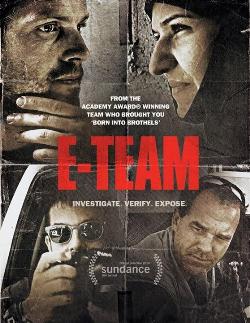The E-Team begins with two human rights researchers interviewing a family in their home in Syria who have just lost several family members in a government air raid. Suddenly a government jet screams overhead on another bombing run and the family, along with the researchers, move away from the windows, anxiously waiting to hear where the bombs will fall. When the explosions go off some distance away, they go straight back to their interview.
This is the world of the E-Team, a small group of courageous “emergency team” investigators who are sent by the New York-based organization Human Rights Watch to conflict zones around the world to document and expose human rights abuses. The documentary, by accomplished filmmakers Ross Kauffman and Katy Chevigny, follows four of these E Team members as they delve into the conflict in Syria, the civil war in Libya, and ethnic cleansing in Kosovo. It was screened for Los Angeles World Affairs Council members on Thursday.
Fred Abrahams, a New Yorker, documents the deliberate massacres of civilians in Kosovo by Serbian forces, and then faces down Serbian dictator Slobodan Milosevic at the War Crimes Tribunal in the Hague. Peter Bouckaert investigates extrajudicial killings in Libya, and logs the crates of missiles and rockets that have been abandoned by Gadaffi’s forces - he calls his team “criminal investigators for international crimes.” Anna Neistat and Ole Solvang sneak across the Syrian border to document the human rights abuses of Bashar al Assad’s forces against his own people - at no small risk to themselves.
“We are not journalists,” Anna explains to a Syrian woman she is preparing to interview. “We are not trying just to report, but also to make some change.” What characterizes their work, in fact, is not a glamorous brush with danger, followed by a hasty exit, but a time-consuming collection of details, often in hazardous situations, complete with cross-checking and multiple sourcing, so that they can produce authoritative reports that do not rely on single eye-witnesses or testimony that might be somehow one-sided or tendentious. In conflicts rife with propaganda and political spin, the E-Team researchers aim to deal only in documented fact. “Victims exaggerate, perpetrators lie, you can’t take anyone’s word, you have to find real evidence,” Fred Abrahams told the filmmakers. “Nothing compares to being on the ground for the level of information you can gather,” says Anna.
The film also follows these four E-Team members back to their homes - Anna and Ole are married, and live in Paris with their 12 year-old son. Peter goes back home to his family on a farm in Belgium. Fred commutes between Berlin and New York. They emerge not as adrenaline junkies, but as committed researchers who are dedicated to human rights, and will do all they can to expose abuses.
In a Q&A after the screening, Kauffmann and Chevigny made it clear that their interest is in telling a story through interesting characters, not making a news documentary about the Middle East. “We were very clear that a huge part of the film was finding the humanity in our characters, following them home, watching them cook.” By putting the researchers’ peaceful home lives next to the atrocities they experienced in the field, the film raises itself above the level of a news broadcast to a broader look at what it means to be human - and how humans can respond when some commit inhuman acts. The nature of the film requires some portrayal of violence, but the editing is very restrained. “We felt a lot of responsibility to deal with the material sensitively - we didn’t want to use it sensationally,” said Chevigny.
Filming in conflict zones always comes with costs. One sensitive issue that they had to deal with was the fact that one of their cameramen in Libya was James Foley, who was later captured on a subsequent assignment in Syria and then brutally beheaded by ISIS. The film is a testimony to all those brave individuals who are dedicated to exposing the truth in places where evil things are being done in secret - and hoping that revealing the truth will bring about change. “It’s about fighting back against bad people,” says Peter. “It’s nice being on the right side.” The film will be commercially released in theaters and also on Netflix on October 24th.

